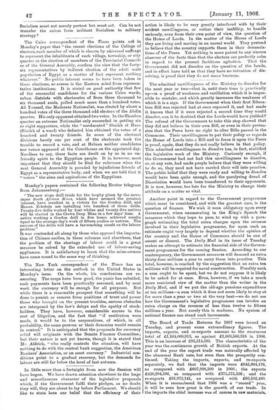The admitted unwillingness of the Ministry to dissolve for the
next year or two—that is, until their time is practically up—is a proof of weakness and vacillation which it is impos- sible to mistake, and which greatly increases the weakness of which it is a sign. If the Government when their first Educa- tion Bill was rejected had at once repassed it, and had made - it known that if it were rejected a second time they would dissolve, can it be doubted that the Lords would have yielded? The refusal of the Government to take this step showed that they did not believe in their own Bill, or even in their preten- sion that the Peers have no right to alter Bills passed in the Commons. Their unwillingness to put their policy as regards the House of Lords into a Bill and to force it upon the Peers is proof, again, that they do not really believe in that policy. This admitted unwillingness to dissolve has, in fact, stultified the legislative work of the Ministry. Curiously enough, if the Government had not had this unwillingness to dissolve, . or, at any rate, had made people believe that they were willing to do so, they need not have carried their will into practice.' The public belief that they were ready and willing to dissolve would have been quite enough, and the paralysing dread of Dissolution would have been transferred to their opponents. It is now, however, too late for the Ministry to change their attitude on a matter so vital.










































 Previous page
Previous page